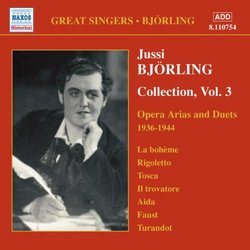| All Artists: Giacomo Puccini, Giuseppe Verdi, Amilcare Ponchielli, Giacomo Meyerbeer, Jules Massenet, Georges Bizet, Friedrich von Flotow, Charles Gounod, Umberto Giordano, Ruggero Leoncavallo, Pietro Mascagni, Nils Grevillius, Hjordis Schymberg, Jussi Björling Title: Jussi Björling Collection: Opera Arias & Duets, 1936-1944, Vol. 3 Members Wishing: 0 Total Copies: 0 Label: Naxos Release Date: 2/17/2004 Genre: Classical Style: Opera & Classical Vocal Number of Discs: 1 SwapaCD Credits: 1 UPC: 636943175422 |
Search - Giacomo Puccini, Giuseppe Verdi, Amilcare Ponchielli :: Jussi Björling Collection: Opera Arias & Duets, 1936-1944, Vol. 3
 | Giacomo Puccini, Giuseppe Verdi, Amilcare Ponchielli Jussi Björling Collection: Opera Arias & Duets, 1936-1944, Vol. 3 Genre: Classical
|
Larger Image |
CD Details |
CD ReviewsThe Thrilling Young Björling in his First Non-Swedish Arias J Scott Morrison | Middlebury VT, USA | 02/25/2004 (5 out of 5 stars) "This disc contains the first arias and duets Jussi Björling recorded in any language other than Swedish. Recorded in Stockholm between 1936 and 1944 (and with a three year gap during the War), the first of them were made when he was only 25. He had already become an international star by that time, having made his official major opera début at the Royal Opera in Stockholm at 19. Of course he had been singing all of his life, having even toured the US with his father and two singing brothers as the Björling Quartet when he was only eight. He had recorded some of these arias in Swedish before, but in addition to singing in the original languages here, the improvement in his technique is notable. For instance, his early Swedish recording of 'Di quella pira' (Il Trovatore) was sung down a whole tone from the original, but in the current version he sings it in the original key and the climactic high C's ring out thrillingly. I'm writing this review before Amazon has listed the precise contents of the disc. I won't take the space to list them, but will try to mention a number of what I think are the highlights. The arias (and two duets) are either in Italian or French; the only German aria here is 'Ach, so fromm' (Martha) but it is sung in Italian as 'M'appari.' There are a few moments where his diction is a bit faulty, especially in the French arias, but this is never a distraction. More important, he seems to know exactly what emotional moment is being expressed and conveys this with his tone color and phrasing. For instance, in the very first selection, 'Che gelida manina' (La Bohème) he captures the doubts and raptures of young love tenderly and ardently. He manages the penultimate rising phrase at 'Et j'étais une chose à toi!,' from 'The Flower Song' (Carmen) with an exquisite soft tone (the score is marked pp) that is nonetheless passionate. 'En fermant les yeux' (Manon) is shiveringly beautiful, if marred slightly by some decidedly non-French vowel sounds; it also seems to have been recorded almost a half-tone sharp making his high C almost a C sharp! This is the young Björling making some of the most beautiful tenor sounds ever recorded. 'E lucevan le stelle' (Tosca) expresses the utter sadness of Cavaradossi's coming death without the sobbing and gulping so typical of many Italians tenors of the time. And it is ultimately the more effective for that. The purity and elegance of his singing here is of a standard that has rarely been matched. There are two duets here, both with Swedish soprano Hjördis Schymberg: 'O soave fanciulla' (La Bohème) and 'E il sol dell'anima' (Rigoletto). In the former one hears an even fresher version of the duet he later sang with Victoria de los Angeles in one of the great complete opera recordings of all time, the 1956 'Bohème' conducted by Beecham. The pair's rapturous harmony at their exit will put a lump in your throat. The elegance of the Rigoletto duet is wonderful, and is helped by the nuanced orchestral accompaniment led by the conductor on all these selections, Nils Grevillius. There are a number of arias here that Björling never sang on stage: the Carmen 'Flower Song' and the Manon aria. He also never sang the two Giordano rôles from 'Andrea Chenier' and 'Fedora'; their two arias ('Come un bel dì di maggio' and 'Amor ti vieta') were recorded in 1944 after his three-year hiatus, and are notable for their fervor and clean line. Radamès was a rôle he sang only very few times. Yet his 'Celeste Aida'is beautifully sung with dramatic heft. His performance of 'Nessun dorma' (Turandot) is marked by his refusal to croon it as some tenors do. It is a stentorian rebuttal of the cruel queen's order that no one sleep. Finally, two arias by Verdi must be lauded: 'Questa, o quella' (Rigoletto) and 'Di' tu se fedele' (Ballo in maschera). They are virile, cleanly sung, expressive without being histrionic. The same is true of that most maudlin of all Italian arias, 'Vesti la giubba' (Pagliacci); there is no hysterical sobbing or laughing and yet one feels Canio's heart breaking.This is the young Björling at the beginning of his career. The voice is fresh, thrilling, flexible, utterly solid from top to bottom, and it is operated by a keen intelligence. This release is not to be missed by those who do not already own a previous incarnation of these performances. It must be said that the transfer from 78s done by Swedish transfer engineer, Stefan Lindström, is expemplary. Thank you, Naxos, for bringing us this wonderful series. TT=65:34Scott Morrison" Beware Canzone | California | 10/18/2004 (5 out of 5 stars) "I'd give most any Bjorling recording 5 stars, and I do here for the singing. But a big question arises: are these the exact same performances released by EMI on their Bjorling series? I haven't checked every listing, but they sure sound the same."
|

 Track Listings (23) - Disc #1
Track Listings (23) - Disc #1